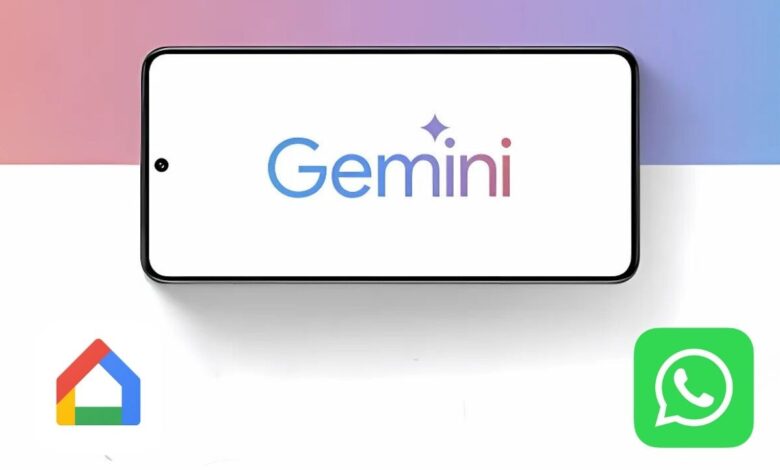Table Of Contents
In a rapidly evolving tech landscape, artificial intelligence is reshaping how we interact with everyday tools. Google’s latest AI innovation, Gemini, is proof of this transformation. Gemini, designed as a next-generation assistant, is pushing the boundaries of AI integration on Android devices by offering seamless control over smart home systems and popular communication platforms like WhatsApp. This move signifies Google’s commitment to enhancing user experience in the AI-driven era. In this article, we delve into the recent developments and explore how these updates are setting a new standard in AI-driven personal assistants.
Gemini Introduces WhatsApp Integration for Seamless Communication
One of the most notable additions to Gemini is its integration with WhatsApp, a globally popular messaging platform. This new extension enables users to interact with WhatsApp via natural language commands, a significant leap forward from the limited functionalities of traditional voice assistants.
By using conversational prompts, users can now send messages, suggest edits, and initiate calls on WhatsApp without ever leaving the Gemini interface. Unlike Google Assistant, which required users to navigate through extra steps, Gemini’s integration offers a more streamlined, intuitive experience. However, some limitations exist, such as the inability to send media files or respond to notifications. Additionally, messages sent through this integration are not end-to-end encrypted, which could raise concerns among privacy-conscious users.
Despite these restrictions, the WhatsApp extension is an exciting step toward a more conversational and versatile AI assistant, signaling Google’s intention to make Gemini a central part of Android’s communication ecosystem.
Enhancing Smart Home Control with Google Home Integration
Alongside WhatsApp, Google has equipped Gemini with the ability to control smart home devices through conversational language. The new Google Home extension allows users to manage a range of smart devices, such as lights, thermostats, and speakers, using simple, natural language commands.
For instance, instead of issuing a specific command like “turn on the living room lights,” users can say, “It’s too dark in here,” and Gemini will understand and execute the action. This conversational approach adds a layer of convenience, making the interaction with home devices feel more intuitive and less robotic. However, certain security-related devices, such as locks and cameras, cannot be controlled through this interface. For these functionalities, users will be redirected to the Google Home app.
While the Google Home integration is a powerful addition to Gemini, it still has limitations, particularly when it comes to managing multiple devices simultaneously. For now, Gemini processes only one command at a time, leaving room for further enhancements in future updates.
Gradual Rollout and Current Limitations
The new features, including WhatsApp and Google Home control, are being rolled out gradually, and not all users will have immediate access. Currently, these functionalities are available only in English and are restricted to Android devices. Moreover, access to these features requires joining Google’s Public Preview program, which allows users to experience new updates before they become widely available.
It is also worth noting that the WhatsApp integration does not work from a locked screen, limiting its utility for users seeking quick access. Additionally, Gemini’s control over smart home devices is still incomplete, particularly when it comes to security systems, as it cannot handle operations that require a PIN or stream video from cameras.
Despite these limitations, the gradual rollout reflects Google’s cautious approach to ensuring that the new features are well-tested before becoming universally available. This strategy aligns with their goal of delivering a polished, reliable AI assistant that can eventually replace Google Assistant.
A Glimpse Into the Future: More App Integrations on the Horizon
Google’s vision for Gemini extends beyond just WhatsApp and Google Home. The company has hinted at future integrations with other popular apps such as Spotify and Google Messages. These updates would further solidify Gemini as a comprehensive, all-in-one assistant for Android users, transforming it into a versatile hub that controls communication, entertainment, and home automation.
As Gemini continues to evolve, it is clear that Google aims to make it a cornerstone of the Android ecosystem, offering users more than just voice commands. By weaving together AI, natural language processing, and app integrations, Google is positioning Gemini as a powerful tool that could redefine how we interact with technology on a daily basis.
Google’s Gemini AI is a bold step forward in the realm of artificial intelligence, providing both enhanced communication through WhatsApp and smart home control via Google Home. Though limitations still exist around security devices and certain functionalities, these updates underscore Google’s commitment to refining its AI offerings. As Gemini expands its capabilities with future app integrations, it is poised to become a central part of the Android experience, potentially replacing Google Assistant in the near future. This latest innovation reflects the growing influence of AI in our daily lives, offering more intuitive, streamlined interactions with the technology that surrounds us.


